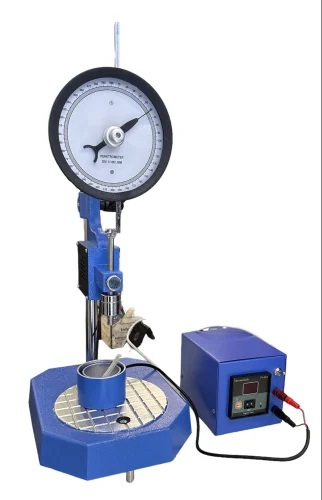
Penetrometer

A Penetrometer is a laboratory or field testing instrument used to determine the consistency, hardness, or strength of various materials such as soils, bitumen, food, and other semi-solid substances. It works by measuring the depth or resistance of penetration of a standard needle, cone, or plunger under a specific load and time. In civil engineering, it is commonly used for testing the consistency of bitumen (penetration test) and soil compaction characteristics.
Features of Penetrometer: -
- Sturdy Construction: Made of rigid metal body ensuring stability during testing.
- Dial or Digital Indicator: Measures and displays penetration depth accurately (in millimeters or tenths of a millimeter).
- Adjustable Weights/Loads: Allows application of standard loads for different test requirements.
- Penetrating Needle or Cone: Standardized attachments for testing various materials (e.g., needle for bitumen, cone for soils).
- Timing Device/Release Mechanism: Ensures consistent test duration (usually 5 seconds for bitumen penetration).
- Versatility: Can be used for testing soils, bitumen, food textures, creams, and gels depending on industry.
- Portable or Bench-Top Models: Available in both types depending on laboratory or field applications.
- Compliance with Standards: Conforms to ASTM, IS, or BS testing standards for accuracy and reliability.